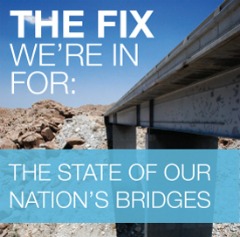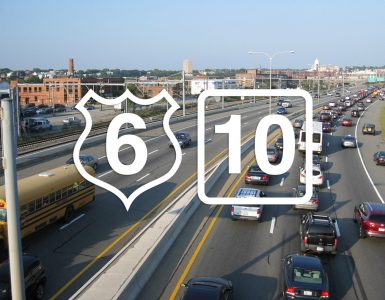 Transportation for America released a report today on the state of our nation’s bridges. Hint, the news is not good.
Transportation for America released a report today on the state of our nation’s bridges. Hint, the news is not good.
A new look at structurally deficient bridges in metropolitan areas finds that just a quarter of U.S. bridges, located in our largest metropolitan areas, carry 75 percent of all traffic crossing a deficient bridge each day.
On the heels of the sudden closure of a major commuting bridge in Louisville, KY, a new report shows that more than 18,000 of the nation’s busiest bridges, clustered in the nation’s metro areas, are rated as “structurally deficient,” according to this new report from Transportation for America.
In Los Angeles, for example, an average 396 drivers cross a deficient bridge every second, the study found. The Fix We’re In For: The State of Our Nation’s Busiest Bridges, ranks 102 metro areas in three population categories based on the percentage of deficient bridges.
The report found that Pittsburgh, PA had the highest percentage of deficient bridges (30.4 percent) for a metro area with a population of over 2 million (and overall). Oklahoma City, OK (19.8 percent) topped the chart for metro areas between 1-2 million, as did Tulsa, OK (27.5 percent) for metro areas between 500,000-1 million.
The Providence Metro area (which includes the entire state of Rhode Island plus Bristol County, Massachusetts) ranked third worst of metropolitan areas with a population between 1 and 2 million. 18.6% or 212 of our bridges were ranked as deficient with a daily traffic count of 3,933,150 on deficient bridges.
In order to prevent future catastrophes on our nation’s roads and bridges, the report recommends that Congress should:
- Provide states with increased resources to repair and rebuild. States need federal support to back their efforts to prioritize repair and maintenance.
- Ensure that funds sent to states for bridge repair are used only for that purpose, unless a state can show it has addressed its repair needs.
- Require that new or rehabilitated be built so that they are safe for everyone who uses them, whether they are in vehicles, on foot or bicycle, or using public transit.
Learn More and download the full report [.pdf]. The State of Rhode Island’s Bridges [.pdf].
Update:
RIDOT released a statement today refuting Transportation for America’s numbers.
The Rhode Island Department of Transportation (RIDOT) is correcting a report released today by Transportation for America. The report lists an incorrect number of structurally deficient bridges for Rhode Island.
The number that “The State of Our Nation’s Busiest Bridges” uses for the Providence metro area also includes bridges in New Bedford and Fall River, Massachusetts. Statewide, Rhode Island has 155 bridges that are classified as structurally deficient. The report lists 212.
For more information on Rhode Island’s bridges, please visit the RIDOT website.
I don’t know what RIDOT is not understanding, the report clearly stated it was ranking by metro area, which for Providence includes the entirety of Rhode Island plus Bristol County, Massachusetts (home to New Bedford and Fall River). That is where the report gets 212 deficient bridges from.
In the state report [.pdf], which includes only the state of Rhode Island, not Bristol County, MA, there are 163 structurally deficient bridges. I cannot account for the descrepancy between RIDOT’s 155 and Transportation for America’s 163.





No surprise about our rankings. 2-3 years ago Governor Carcieri appointed a “blue ribbon commission” of movers and shakers (no enviros, transit folks, hippies…) who reported our road/bridge/transit problems and recommended a 10 year plan basically doubling transportation spending (including at least maintaining transit service) with a variety of new revenues including raising the gas tax, tolls, registration fee hikes, and possibly a miles-travelled fee. Despite the need, that Governor ignored these recommendations, though he did take the last 1 cent of the gas tax that had been going to the General Fund and give it to RIDOT (with Assembly approval.) As I see it, he preferred talk radio crowd approval to addressing the problem. The Assembly was glad to kick the can down the road too.
The stimulus, and even the floods, have helped things from getting worse due their additional one-time revenue, but I note the report posted above doesn’t say how the “additional resources” to be given to the states will be paid for. The politicos are afraid to raise the gas tax, not increased since 1993, and this has stymied most attempts to increase transportation infrastructure spending on a continuing basis. A basic problem is the general unwillingness to stand up to those who attack all attempts to increase revenue.
Wow, RIDOT has some balls to just come out and say that we’ve “only” got 155 structurally deficient bridges.
This is more revealing than most appear to think.Look at the naional tables see the younger upstarts with newer bridges like Orlando being safest.Providence grew up in the “Moses Days” of infrastructure.Give the metro time to mend.The city and environs must tackle a problem that is sure to give it rewards&awards,in the mean time face it ;this is the northeast.
another matter that glares at me .Providence,Boston,are both in the midst of massive restructuring.Can the same be said of Louisville.